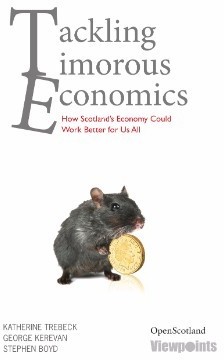 Please buy the book here. CommonSpace columnist Ben Wray review.
Please buy the book here. CommonSpace columnist Ben Wray review.
Using Scotland as an example, Tackling Timorous Economics shows how economics could work better for all of us, as opposed to the people serving the economy. They believe that current economic policies are not aligned with what we as people need in these times of rampant inequality and inequitable distribution, advocating an increased focus on the quality of Scotland’s economy. There are 3 chapters:
- Katherine Trebeck argues that our economic system is broken – it has become dysfunctional, seeking growth and profits at almost any cost – with the sustainability and quality of growth, and distribution of its benefits, being ignored. So what would a “for everyone economy” look like? Progress would be defined less by GDP than “improvement in the sustainable and equitable wellbeing of society”. She begins by outlining a broad programme for a “new economic paradigm” premised on the quality of growth and jobs as our primary success criteria, not growth and jobs as such, which is unsustainable and does not meet social need. She proposes a wide-range of policies and practices that would make this transition happen, from creating “pro-social businesses” that are anchored locally to “shifting the tax burden to capital, wealth and harmful activities”.
- Stephen Boyd asks whether Scotland is serious about wanting a more equal country (it is already more equal than England). He argues that we need to be precise about defining inequality (Wealth? Income? Post tax?). He asserts that an effective inequality reduction strategy must attack the problem from both ends – rich and poor. He challenges the view that the enormous growth in inequality is largely an unassailable consequence of globalisation that governments have little control over. He describes the Council Tax freeze as “timid and regressive”. While arguing that widening the tax base (and increasing the tax take as per the Nordic model) is essential, he is sceptical of arguments “for more and better jobs” – for example, an enlarged financial sector in Scotland would not necessarily be good for the Scottish economy as a whole, as the dominance of finance can act as a drag politically and economically on productive sectors of the economy. He recommends Tony Atkinson’s book “Inequality: what can be done?” and compares it to the Scottish Government Independent Advisor’s report on Poverty and Inequality.
- George Kerevan offers an accomplished critique of global capitalism and a case for a new approach from the left internationally in order to begin trying to usher in a new economic order. He acknowledges capitalism’s enormous productive efficiency over previous modes of production, but says that the current crisis is evidence that it is having an existential crisis: “the central problem is that the system is finally generating more profits than it can safely or purposefully use”. His analysis is that we can clearly see signs of the neoliberal era coming to an end in debt deflation, financial bubbles, stagnating incomes, the threat of automation to skilled jobs and environmental crises. Historically, crises served to cleanse the system of excess capital, whereas now the financial system has grown too big for governments to allow it to fail. This has created 3 inter-related problems: a glut of capital not serving a socially useful purpose, too low wages and insufficient jobs. The latter will grow in importance due to the future effects of automation – one million jobs have an 80% chance of disappearing (out of a working population of 2.6 million). Transitioning out of capitalism would require extraction of idle capital in big corporations being put to use for public investment, a wealth tax on assets, and a move away from free trade towards a degree of protectionism to create world class firms. His vision is experimental market socialism: active labour management policies, a Scottish Investment Bank, and a democratised economy of worker co-ops, competing with one another but without the monopolies and pursuit of profit at any cost of corporate capitalism.
Yes Edinburgh West has a website, Facebook, Twitter, National Yes Registry and a Library of topics on Scottish Politics, including Business & Economy.
